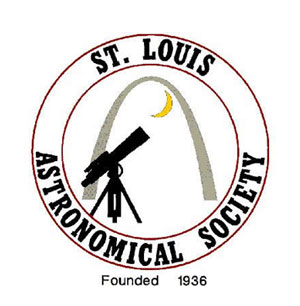SLAS Regular Meeting
McDonnell Hall, Washington University - St. Louis
7:30pm Friday, April 19, 2024
“NASA's Juno Mission to Jupiter”
by
Fran Bagenal, PhD; University of Colorado, Boulder
Juno’s goal is to understand the origin and evolution of Jupiter. Underneath its dense cloud cover, Jupiter safeguards secrets to the fundamental processes and conditions that governed our solar system during its formation. As our primary example of a giant planet, Jupiter can also provide critical knowledge for understanding the planetary systems being discovered around other stars. With its suite of science instruments, Juno is investigating the interior structure, mapping Jupiter's intense magnetic field, measuring the distribution of water and ammonia in the deep atmosphere – and exploring the mysterious Great Red Spot. As its orbit has evolved over 8 years, the spacecraft has also made flybys of the Galilean moons Ganymede, Europa and Callisto. JUNO is also the first spacecraft to fly over Jupiter’s aurora and measuring both the energetic particles raining down on the planet and the bright “northern & southern lights” they excite. A huge bonus is the small public outreach camera that is taking fantastic images of Jupiter’s beautiful clouds. The images – some science, some art – are processed and shared by the public around the world. NASA’s JUNO mission was launched in August 2011 and has been in orbit over Jupiter’s poles since 4th July 2016.
Dr. Fran Bagenal is a research scientist and professor at the University of Colorado, Boulder and is co-investigator and team leader of the plasma investigations on NASA’s New Horizons mission to Pluto and the Juno mission to Jupiter. Her main area of expertise is the study of charged particles trapped in planetary magnetic fields and the interaction of plasmas with the atmospheres of planetary objects, particularly in the outer solar system. She edited the monograph Jupiter: Planet, Satellites and Magnetosphere (Cambridge University Press, 2004).
Born and raised in the UK, Dr. Bagenal received her bachelor degree in Physics and Geophysics from the University of Lancaster, England, and her doctorate degree in Earth and Planetary Sciences from MIT (Cambridge, Mass) in 1981. She spent five years as a postdoctoral researcher at Imperial College, London, before returning to the United States for research and faculty positions in Boulder, Colorado. She has participated in several of NASA's planetary exploration missions, including Voyager 1 and 2, Galileo, Deep Space 1, New Horizons and Juno.
https://lasp.colorado.edu/home/mop/home/people/fran_bagenal/
https://www.imdb.com/name/nm3293128/bio?ref_=nm_ov_bio_sm
The meeting will begin at 7:30 PM Friday, April 19 in McDonnell Hall, Room 162, on the Danforth campus of Washington University, Saint Louis, MO 63105. McDonnell Hall is accessible from Forsyth Boulevard via Tolman Way. Free yellow zone and garage parking spaces are available. The event will also be available via Zoom online conference.
To request Zoom link, please click here
The event, cosponsored by NASA's Missouri Space Grant Consortium, is open to the public free of charge.
Meeting Agenda
Main Speaker
SLAS Board Member Nominations for May Elections
Announcement Special Recognition Award Nominations are due by Sep 1st.
Register now: MSRAL 2024 June 7-9, Hosted by Omaha Astronomical Society
Please renew your Expiring Memberships. LINK
SLAS has 2024 group permits for Whiteside and Danville.
Upcoming Meetings:
May 2024: Gautham Narayan, PhD “Understanding the Dark Universe with the Vera Rubin Observatory”; Univ of Illinois
June 2024: Steven R Gullberg, PhD. “Archeoastronomy”; University of Oklahoma
July 2024: Ashley Davies, PhD. “Juno Close Flybys of Io"; JPL
August 2024: Bradley Tsalyuk, Samuel Oschin Air and Space Center, California Science Center
September 2024: Joseph Marcus, MD, "“Who Discovered the Expanding Universe? Spoiler: Not Hubble!”
October 2024: Pamela Gay, PhD., "Secret Squirrel Stuff", Planetary Science Institute
November 2024: Robert Zubrin, PhD. “The Case for Mars”; The Mars Society
January 2025: Bhupal Dev, PhD. “Finding New Physics in Debris from Colliding Neutron “Stars; Washington University.
March 2025: Tom Rathjen "What’s Happening in Human Space Flight”; The Aerospace Corporation
SLAS in the News
HECMedia: Dark Sky Missouri - Stacy Park Olivette, MO
Ladue News: Seeing stars: Upcoming events and opportunities for St. Louis stargazing,
Jefferson County Leader: Aim for the Stars, By Kevin Carbery, July 27, 2023
https://www.kmov.com/video/2023/06/20/great-day-4-kids/
Aug 24, 2023 myMOinfo.com: St. Louis Astronomical Society Offering Free Upcoming Activities at Jefferson College
Aug 30, 2023 KTVI: Special Super Moon
Sep 11, 2023 KETC TV Missouri Eclipse Task Force (starts around 13:30 minutes)
Oct 6, 2023 St Louis Post-Dispatch
Get your glasses ready: Another total solar eclipse is coming near St. Louis in 6 months
Oct. 10, 2023 St. Louis County Library
Our new SLAS coffee mugs have arrived. They will be available to purchase at
our regular meetings at Washington U. Price: $10 each, 2 for $15
2024 Astronomy Events by Mark Jones
Social Hour - 30 min after meeting conclusion or 10:30 Which ever is earlier.
Randy Harrison's Lookin' Up Optics page: http://lookinup.info/
Here are the websites that Dr. Gokhale mentioned in his talk in June
Dark Sky Missouri
www.darkskymissouri.org
Video: 'Saving the Dark' A film on Light Pollution by Sriram Murali
https://www.youtube.com/watch?v=6fHxNn-FEnc
Globe at Night program for light pollution
Telescopes for Sale!
Shirts and Mugs for sale!
Shirts and Mugs for Sale
All shirts are $10!!!
Moon Shirt
Globular Cluster Shirt
Pleiades Shirt
There is also a Dobsonian shirt
New Poster from Guy Ottwell you might be interested in
It's called the Zodiac Wavy Chart
https://www.universalworkshop.com/zodiac-wavy-charts/?mc_cid=cfa6f33be8&mc_eid=9d6fcdbdfa

